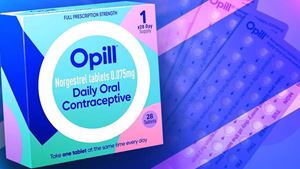
Of the 6.1 million pregnancies that occur each year in the United States, nearly half are unintended. Using birth control at regular intervals can help to reduce unintentional pregnancies.
The FDA recently announced the approval of a new daily oral contraceptive called Opill, which is now approved for over-the-counter use. This is the first over-the-counter method of birth control available in the United States, meaning anyone can buy it at pharmacies, grocery and convenience stores, or online. The U.S. joins more than 100 other countries that already have birth control available over the counter.
Rebecca Alicandro, MD, is an OBGYN provider with a specialty focus in family planning. She explains how the newly-approved medication works, its side effects, and why having birth control available over the counter is important for so many people.
The new oral contraceptive Opill contains a single hormone called norgestrel, which is a type of progestin. When taken daily at the same time each day without having any delays or missed doses, the pill prevents pregnancy at a 98 percent efficacy rate. It is safe for almost everyone with the potential for pregnancy.
Opill is meant to be used on its own – not as an additional form of birth control. Anyone using another oral contraceptive tablet, vaginal ring, contraceptive patch, contraceptive implant, contraceptive injection, or an IUD should not use this in addition to their current birth control method. Opill does not protect against STDs, however, so users can and should continue to use condoms to prevention infection.
Packs of Opill will be sold in one-month, three-month, and six-month packs, which cost $19.99, $49.99, and $89.99, respectively.
Some women may experience side effects from Opill, such as:
Women with a history of breast cancer or any other type of cancer should talk with their OBGYN before using this method of birth control.
Some medications may interact with Opill and decrease its overall effectiveness – including medications taken for seizures, tuberculosis, HIV/AIDS, or pulmonary hypertension. Patients can ask their primary care provider or OBGYN about these medication interactions.
“If you have an OBGYN, please bring your questions directly to your provider,” Dr. Alicandro said. “We are always happy to see you. Simply because birth control is now available over the counter does not mean we will stop prescribing it. Please talk to your provider if you have questions.”
Until the approval of Opill, daily birth control was only available via prescription, which limited the number of people who had access to it.
Research shows unintended pregnancies are linked to negative health outcomes for both mother and baby. This change to make birth control more widely available has the potential to reduce barriers to high-quality health care and improve people’s lives.
“Some patients have difficulty getting access to birth control, such as making it to appointments, paying for visits, getting transportation to go to a doctor or even having a doctor available in their area,” Dr. Alicandro said. “This puts the power of deciding when a patient gets pregnant back in their own hands.”
